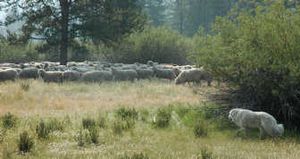Other predators benefit from focus on wolves
WILDLIFE -- While the Rocky Mountain reigon's wildlife control agents are forced to focus on wolves, coyotes, grizzly bears, black bears and mountain lions are making a killing on livestock.
"Our wildlife control people spend so much time with wolves that they’re being taken away from the other predators and our ranching industry is getting hammered," Montana state Sen. Greg Hinkle (R-Thompson Falls) said in a Sunday story by The Helena Independent Record
For example, in Montana:
- Coyotes killed 1,348 calves in 2010, up from 111 calves in 2006. They killed 2,488 lambs and 422 adult sheep this year, up from 698 lambs and 135 adult sheep in 2006.
- Grizzly bears killed 32 calves in 2010, up from five in 2006. They killed 12 lambs and 29 adult sheep in 2010, up from no lambs and two adult sheep in 2006.
- Mountain lions killed four calves in 2010, up from two calves in 2006. They killed 91 lambs and 36 adult sheep in 2010, up from nine lambs and 14 adult sheep in 2006.
- Wolves killed 454 calvs in 2010, up from 51 calves in 2006. They killed 48 lambs and 728 adult sheep in 2010, up from six lambs and 22 adult sheep in 2006.
Read on for more context from the Helena Independent story.
The figures above are for the federal fiscal year, which runs from Oct. 1 through Sept. 30.
John Stueber is the Montana's director for the U.S. Department of Agriculture’s Wildlife Services bureau, which is in charge of predator control. He believes that the increase in killing livestock by the other large predators came about for two reasons: the federal agency has been so focused on dealing with wolf depredations that it can’t undertake previous proactive measures to prevent coyotes, black and grizzly bears, mountain lions and foxes from killing livestock; and the presence of wolves on the landscape is limiting the ways they can deal with the other large predators.
He notes that they used to be able to use a pesticide to kill coyotes, but can’t do so anymore because of the risk it poses to wolves, which are on the list of animals protected under the federal Endangered Species Act. They also have to check traps daily now, in case a wolf is caught in one set up for a coyote.
Wolves were trapped and poisoned to near extinction in the early 1900s, but between natural migration from Canada and reintroduction by humans in Yellowstone National Park and Idaho in the mid 1990s, they now number about 1,700 in the northern Rocky Mountains.
"It’s not just the time spent dealing with wolves, but the restrictions because of having to deal with wolves," Stueber said. "And now grizzly bear populations are large enough that they’re moving back onto the plains, which puts them into the middle of livestock."
Stueber said he’s hearing more complaints about coyote management than he has gotten previously, and he’s not sure how his agency will handle it. He notes that they haven’t received any additional personnel or funding since the early 2000s, while their operating expenditures, like gas and maintenance, have increased.
Hinkle added livestock producers pay a tax based on the number of livestock they own, which in turn pays for some of Wildlife Services’ costs. He’s not sure how to handle this, but said something needs to change.

